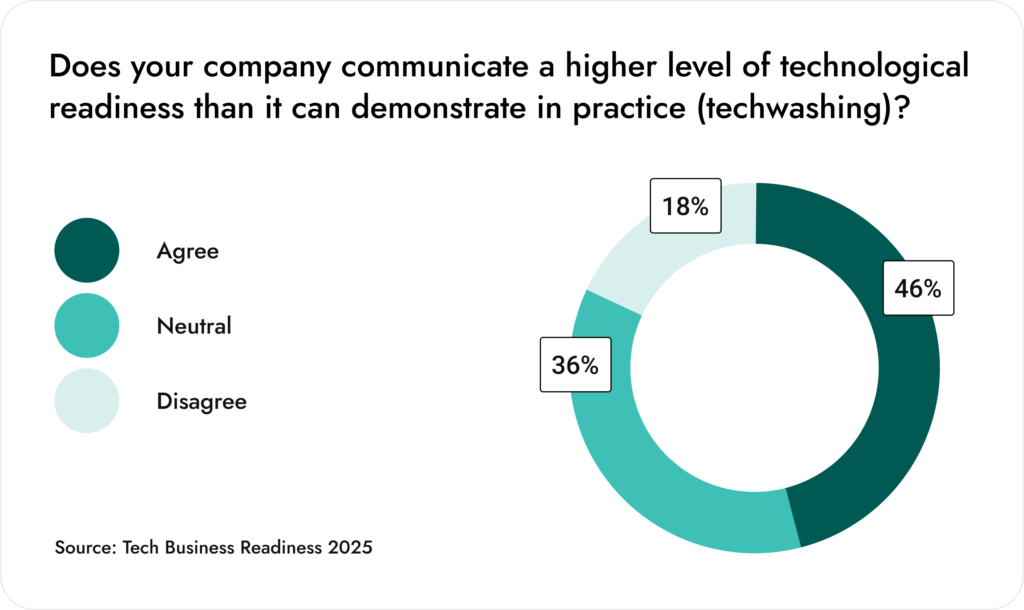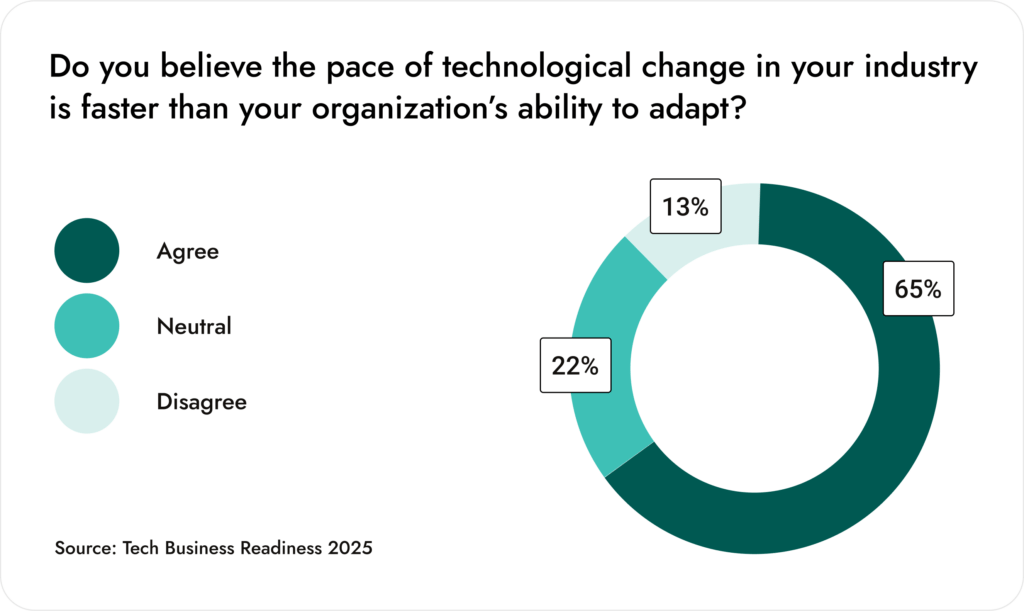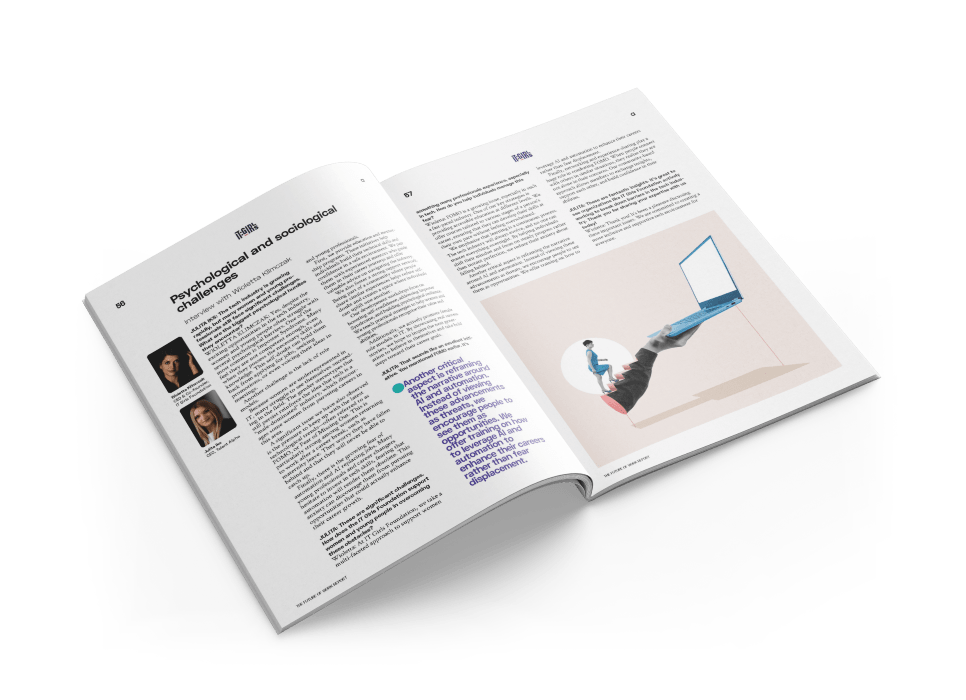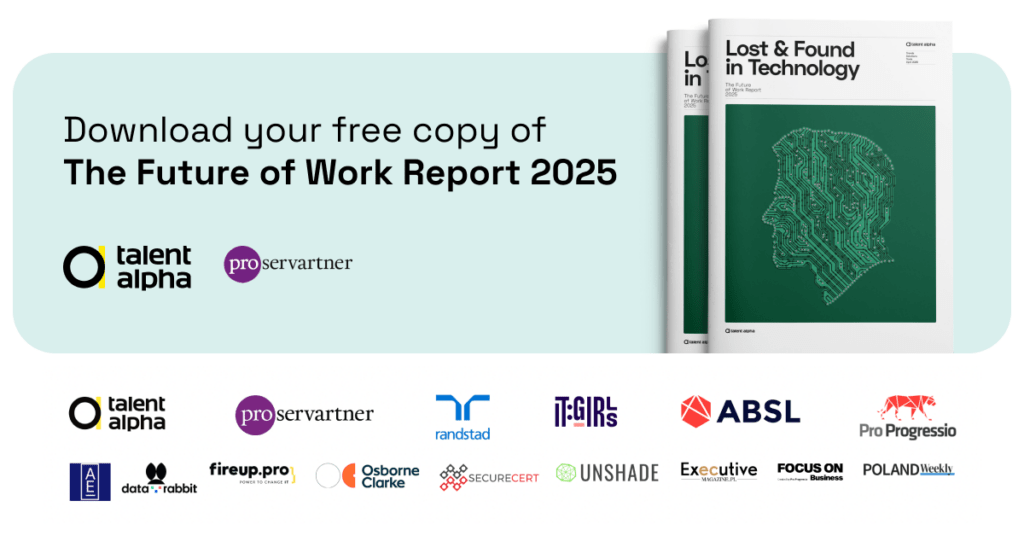Only 13% of Companies Declare They Can Keep Up with the Pace of Technological Change
In a world where technology is revolutionizing industries and reshaping the way we work, organizations face not only unprecedented opportunities but also complex challenges. According to the latest report by Talent Alpha and Proservartner, Lost & Found in Technology, many companies are unprepared for the accelerating pace of technological change. In fact, only 13% of respondents in the Tech Business Readiness survey, conducted for the report, believe their companies can keep up with this rapid shift.
The newest edition of the Future of Work report delves into the practical aspects of integrating cutting-edge technologies, drawing on real-world examples and expert insights. From the transformative impact of artificial intelligence and analytics to innovations in HR, finance, and logistics, the report offers a comprehensive guide to navigating the future of work.

Technological progress is accelerating at an unprecedented rate, making it increasingly challenging for organizations to adapt. Not everyone can keep pace with new realities at the same speed, creating both opportunities and risks.
“Companies that effectively leverage technology can not only enhance their competitiveness but also create real value for their customers and employees. However, the key to success lies in smart innovation management—balancing its potential with a responsible approach to risk. The Lost & Found in Technology report provides valuable insights, highlights best practices, and explores key challenges. It also offers concrete recommendations on how to navigate this new reality,” says Julita Iks, CEO of Talent Alpha, a platform that connects and manages IT specialists across 55 countries, and host of the report.
The co-host of the report is Proservartner, one of Europe’s leading GBS consulting firms specializing in optimizing and scaling global business services. Randstad serves as the strategic partner of the publication, while the report is published under the patronage of the IT Girls Foundation.

Readiness for Change is Essential
In a rapidly evolving technological landscape, adaptability has become a key success factor. However, companies often overestimate their readiness for transformation, leading to a gap between expectations and reality.

“46% of companies overestimate their technological readiness, creating a gap between perception and reality. This is not just an inefficiency—it threatens competitiveness and growth. Technology moves fast, and hesitation means losing ground,” says Rakesh Sangani, CEO and founder of Proservartner, co-host of the report.
In the era of rapid technological advancement, organizations must not only keep up with change but also stay ahead of it and manage it effectively. However, many companies struggle with the growing gap between the pace of innovation and their ability to adapt. The scale of this challenge is significant.

“According to research conducted for this report, 65% of respondents believe that the pace of technological change in their industry is faster than their organization’s ability to adapt. This widening gap highlights the urgent need for companies to build resilience, agility, and a future-oriented approach to digital transformation,” comments Julita Iks, Talent Alpha.
“The pace of advancement is relentless. AI-driven automation, real-time analytics, and advanced cybersecurity are not future trends—they are shaping industries now. The question is not whether to adopt them but how quickly and effectively it can be done. Every delay means lost opportunities, reduced efficiency, and a shrinking market position,” adds Rakesh Sangani, Proservartner.
Reskilling and Upskilling:
The Key to Survival in the Technological Era
Technology is also transforming the job market, making the ability to adapt to new realities crucial for both companies and employees. Reskilling and upskilling are no longer optional but strategic necessities. Moreover, employees themselves recognize the importance of professional development and expect genuine opportunities from employers to gain new skills.
“Rapid technological changes are redefining the job market, making reskilling and upskilling key elements of organizational strategy. Organizations benefit from the fact that professional development aligns with employees’ interests, and they are well aware of this. Seven out of ten talents consider skill enhancement crucial for their careers, and two out of five would consider leaving their jobs if there were no opportunities for growth. This is a clear signal to employers: investing in talent development is not just a competitive advantage but a survival requirement. Organizations that prioritize skill development will earn employee loyalty and secure the necessary competencies for the era of technological transformation,” says Mateusz Żydek, labor market expert at Randstad Poland.
According to the Tech Business Readiness survey, one of the top three challenges in implementing new technologies is the lack of employees with the right skills or technological expertise.

Invisible Technological Barriers – Psychological Blocks to Development
Technology offers a space for constant innovation and dynamic opportunities, but it also brings challenges that extend beyond technical abilities.
“Although the tech industry offers many opportunities, those working in it often face psychological barriers. One of them is the so-called impostor syndrome—the feeling of not deserving success despite possessing the necessary skills and achievements. For women, challenges also include limited access to role models and persistent gender stereotypes that reinforce the belief that technology is a male domain. An additional difficulty is the pressure to stay constantly up-to-date with trends – especially felt by those returning to work after a long break, such as maternity leave or illness. There is also a growing fear of automation and artificial intelligence, which, instead of motivating, can discourage individuals from taking further career development steps,” says Wioletta Klimczak, president and co-founder of the IT Girls Foundation.
See, how companies around the world are truly utlize technology, it’s benefits and dark sides. Download your copy of the FoW 2025 report: https://talent-alpha.com/future-of-work-report-2025-lost-found-in-technology/



Read also
Talent Alpha now has 1,000 partners in 55 countries
The Future of Work Report 2024 is here
A comprehensive guide for leaders in today's and tomorrow’s AI-ed world.
The Tech Talent Business Survey Report 2023 is now released
43% of IT service companies are experiencing a shortage of new business opportunities. Find out what else has shifted in this year’s report.